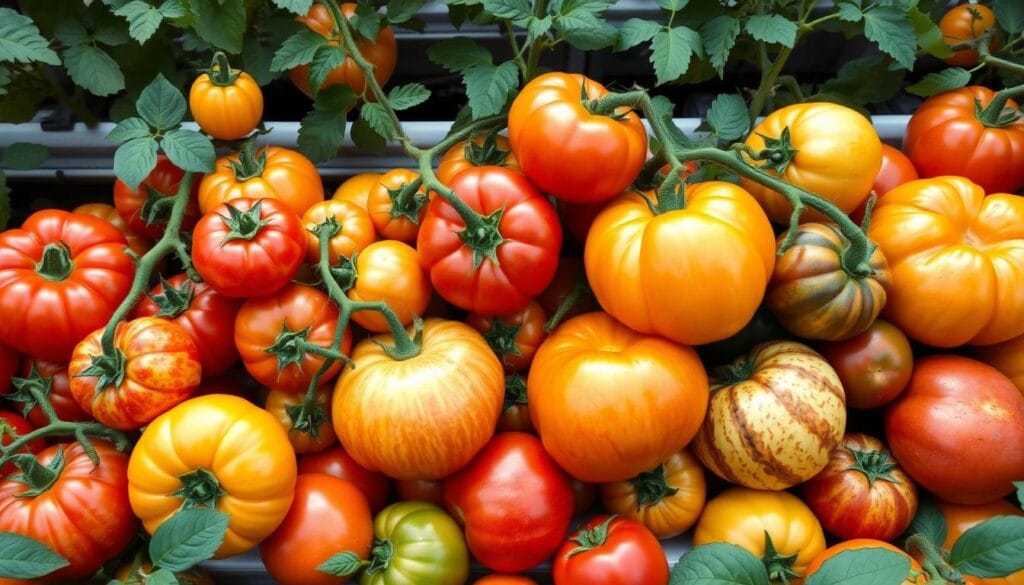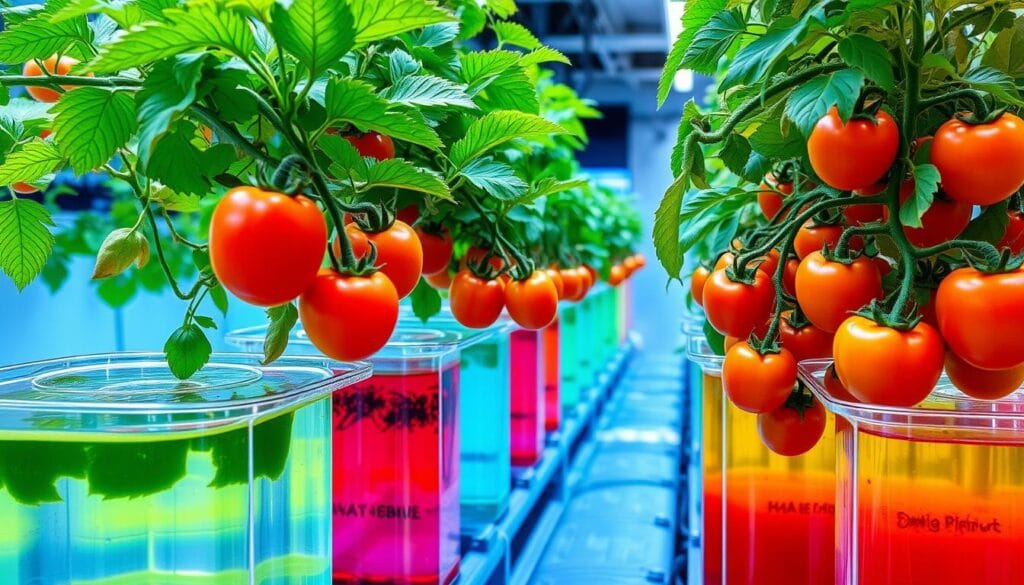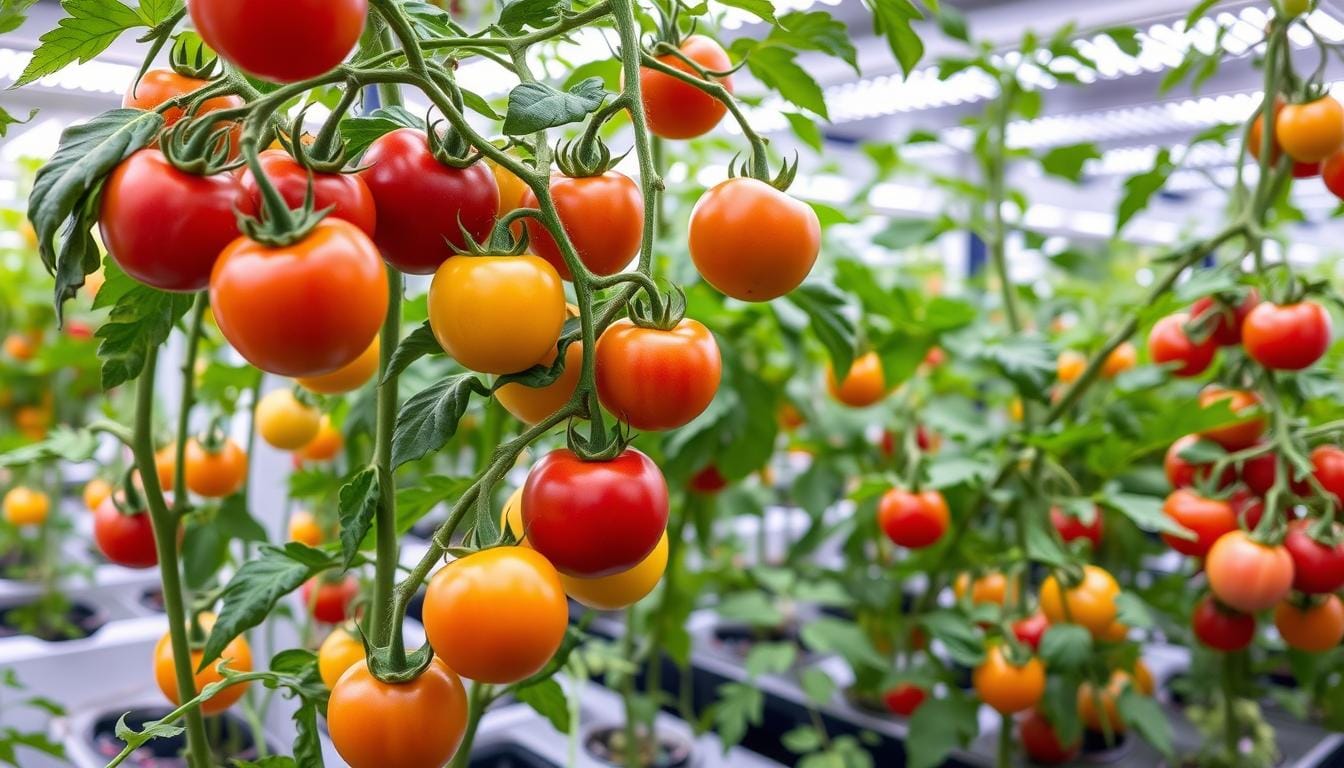Growing heirloom tomatoes in a hydroponic kit is more than a hobby. It’s a journey into sustainable farming. Imagine picking tomatoes that are ripe with flavor, right from your indoor garden. This way, you can enjoy fresh tomatoes all year, without worrying about the seasons.
Indoor tomato growing has changed how we get fresh food. Now, you can grow tasty heirloom tomatoes anytime, no matter the weather or space outside.
This guide will teach you how to master indoor tomato growing like a professional. You’ll turn your space into a lively garden. It will give you tomatoes that taste amazing and are full of nutrients.
Key Takeaways
- By using hydroponic systems, you can save 90% of the water typically required for traditional farming.
- Indoor tomato growing enables year-round fresh produce
- LED grow lights optimize plant development
- Vertical gardening maximizes limited spaces
- Proper nutrient management ensures high-quality tomatoes
Understanding the Benefits of Hydroponic Heirloom Tomatoes
Hydroponic growing has changed how we grow heirloom tomatoes. This method doesn’t use soil and brings many benefits. It’s great for both home gardeners and big farms.
Looking into hydroponic tomatoes shows many benefits. This growing method is becoming more popular among garden lovers.
Enhanced Nutritional Value
Hydroponic systems help grow tomatoes that are full of nutrients. Studies reveal that tomatoes grown hydroponically contain higher levels of vitamins and minerals compared to those cultivated in soil. The controlled environment means the tomatoes taste better.
- Up to 50% faster growth rates
- Higher vitamin content
- More consistent nutritional quality
Year-Round Growing Capabilities
Hydroponic tomato growing lets you have fresh tomatoes all year. You can grow them indoors, no matter the weather outside. This means you can enjoy homegrown tomatoes anytime.
| Growing Method | Growing Season | Yield Potential |
|---|---|---|
| Traditional Soil Farming | 3-4 months | Limited |
| Hydroponic System | 12 months | High |
Space-Efficient Solutions
Hydroponic systems are great for small spaces. You can grow delicious heirloom tomatoes even if you have little room. This is perfect for small balconies or indoor areas.
“Hydroponics transforms urban gardening, making fresh, nutritious produce accessible to everyone.” – Agricultural Innovation Magazine.
Using hydroponic methods opens up new possibilities in gardening. You can enjoy tasty, healthy tomatoes in an efficient and good way for the planet.
Essential Equipment for Your Hydroponic Setup
Starting with indoor tomato growing means picking the right hydroponic kit. The right tools can make your gardening better and increase your tomato yield. Knowing what each piece does is key for a good self-watering system.
For healthy plant growth, your hydroponic setup needs several important items:
- Hydroponic System (NFT, DWC, or Ebb & Flow)
- LED Grow Lights
- Growing Medium
- Nutrient Solution
- Water Pump and Air Stones
- pH Testing Kit
Here’s a breakdown of the must-haves for growing tomatoes indoors:
| Equipment | Purpose | Recommended Type |
|---|---|---|
| Hydroponic System | Plant Support and Nutrient Delivery | Deep Water Culture (DWC) |
| Grow Lights | Photosynthesis and Growth | Full Spectrum LED |
| Growing Medium | Root Support | Rockwool or Coco Coir |
“The right hydroponic kit can turn your tomato growing from ordinary to extraordinary.” – Hydroponic Gardening Experts.
When choosing your self-watering systems, consider space, budget, and growth goals. LED grow lights are great because they save energy and give the best light for plants. This can help your tomatoes grow and produce more.
Growing Heirloom Tomatoes in a Hydroponic Kit
Hydroponic gardening lets you grow tasty heirloom tomatoes at home. This method makes it easy to have fresh tomatoes all year. You can achieve this without requiring much space.
Growing tomatoes indoors with hydroponics needs careful planning. With the right steps, your home can become a garden paradise.
System Assembly Guide
Setting up your hydroponic system is important. Here are the key steps:
- Choose a location with enough light or use grow lights
- Pick the right hydroponic system design
- Prepare your reservoir tank
- Install growing medium
- Put seedlings in net pots
Water and Nutrient Management
Nutrient solutions are vital for growing tomatoes hydroponically. Here’s a quick guide for managing nutrients:
| Parameter | Recommended Range |
|---|---|
| pH Level | 5.5 – 6.5 |
| Water Pump Frequency | Every 2.5 hours |
| Light Exposure | 16-18 hours daily |
Environmental Control Tips
Keeping the right environment is key for growing tomatoes hydroponically. Important factors include:
- Keep the temperature between 65-85°F
- Humidity should be 50-70%
- Ensure air circulation is consistent
- Check the nutrient solution often
“Success in hydroponic gardening comes from understanding your plants’ specific needs and creating an optimal growing environment.” – Hydroponic Experts.
By following these tips, you’ll grow a lot of delicious heirloom tomatoes with your hydroponic kit.
Selecting the Perfect Heirloom Tomato Varieties

Choosing the right heirloom tomato varieties is key to a successful hydroponic garden. You need to know the unique traits of each tomato type. Also, how they grow in a controlled environment.
When picking heirloom tomatoes for your hydroponic setup, keep these points in mind:
- Crop yields
- Flavor profiles
- Plant growth habits
- Space needs
Indoor gardeners should look for compact varieties that do well in hydroponics. Cherry and grape tomatoes are great for these systems. Here are some popular heirloom varieties for hydroponics:
- Sun Gold (sweet, bright orange cherry tomatoes)
- Black Cherry Grape (rich, complex flavor)
- Red Grape tomatoes (consistent, small fruits)
- Roma tomatoes (meaty, perfect for sauces)
“Choosing the right tomato variety can elevate your hydroponic garden from good to extraordinary.” – Hydroponic Gardening Expert.
Think about the growth habits of the tomatoes. Determinate varieties grow as bushes, while indeterminate ones keep growing and fruiting. For small spaces, choose compact varieties with high yields.
When looking at heirloom tomato varieties, consider:
- Disease resistance
- Average fruit size
- Days to maturity
- Flavor intensity
Your choice of heirloom tomato varieties will greatly affect your hydroponic garden’s success. Spend time researching and picking varieties that fit your growing conditions and taste preferences.
Creating the Optimal Growing Environment
For indoor tomato growing to succeed, you need to create a perfect environment. Hydroponic gardening lets you control every part of your tomato’s growth. This means you can make sure your tomatoes grow as well as they can.
When growing tomatoes without soil, you must focus on three key things: temperature, lighting, and humidity. Each one is important for growing healthy, productive tomatoes.
Temperature Control Methods
Keeping the right temperature is key in hydroponic gardening. Tomatoes do best in a certain temperature range:
- Daytime temperature: 65-77°F (18-25°C)
- Nighttime temperature: 55-65°F (13-18°C)
- Consistent temperature prevents plant stress
- Use digital thermometers for precise monitoring
Lighting Requirements
Good lighting is vital for tomato growth and production. In indoor growing, artificial light is your main source:
- Provide 12-14 hours of light daily
- Use high-quality LED grow lights
- Adjust light distance based on plant growth stage
- Ensure even light distribution
Humidity Management
Managing humidity helps prevent disease and supports plant growth. Aim for these humidity levels:
| Growth Stage | Ideal Humidity Range |
|---|---|
| Seedling Stage | 70-75% |
| Vegetative Stage | 50-70% |
| Flowering/Fruiting Stage | 40-50% |
“In hydroponic gardening, environmental control is your most powerful tool for success.” – Hydroponic Expert
By meticulously managing these factors, you can cultivate the ideal environment for your hydroponic tomatoes to thrive. This ensures they grow strong and produce lots of fruit.
Nutrient Solution Mastery
Mastering nutrient solutions is key to a successful hydroponic garden. Your heirloom tomatoes need the right mix of nutrients to grow well. Learning how to manage nutrients can take your garden from good to great.

Here are some tips for making a great nutrient solution for hydroponic tomatoes:
- Keep the pH between 5.8-6.0 for best nutrient absorption
- Check the electrical conductivity (EC) often
- Change the nutrient mix as your plants grow
- Choose a tomato-specific nutrient formula
“Crafting the right nutrient solution is like fine-tuning a diet for peak performance—it’s all in the details.” – Hydroponic Expert.
Experts suggest using special fertilizers for hydroponics. For example, the Hydro-Gardens Chem-Gro tomato formula has a 4-18-38 nutrient mix. It also has magnesium and micronutrients for your plants.
| Nutrient Type | Concentration Level | Growth Impact |
|---|---|---|
| Nitrogen | Moderate | Vegetative Growth |
| Phosphorus | High | Root Development |
| Potassium | High | Fruit Production |
When making your nutrient solutions, remember to use compatible materials. Stainless steel is best because it doesn’t corrode. Also, change your solution often to avoid salt buildup and keep nutrients balanced.
By using these advanced nutrient management tips, you’ll see better growth in your hydroponic tomato garden.
Pruning and Training Techniques
Growing heirloom tomatoes indoors needs careful pruning and training. This directly affects how much you harvest and keeps your plants healthy.
To grow tomatoes well in hydroponics, you must know how to shape and support them. Using the right pruning methods helps your plants reach their full growth. This creates the best environment for them to thrive.
Proper Trellising Methods
Trellising is key for supporting your tomatoes. There are many ways to manage plant growth:
- Vertical string supports
- Adjustable tomato cages
- A-frame trellis systems
- Florida weave method
Removing Suckers for Optimal Growth
Suckers are small offshoots that grow in the space between the main stem and the branches of a plant. Removing these shoots helps your plants focus on growing fruit. This is vital for getting the most from your indoor tomato growing setup.
It’s important to remove suckers from indeterminate tomato varieties. These plants keep producing fruit all season. Pruning lightly also improves airflow and lowers disease risk.
Maintaining the Ideal Plant Shape
- Regular pruning to control size
- Ensuring enough light
- Promoting balanced growth
- Preventing overcrowding
“Pruning is an art that transforms your tomato plants from unruly vines to productive, manageable crops.” – Hydroponic Gardening Expert.
Learning these pruning and training methods will help you grow high-yielding heirloom tomatoes in your hydroponic setup.
Disease Prevention and Plant Health
Keeping your heirloom tomatoes healthy in hydroponics is key. Soilless growing cuts down on pests and diseases. But, you must watch your plants closely to keep them in top shape.
Your hydroponic setup lets you control the growing space. This helps stop diseases from spreading. With the right steps, you can protect your heirloom tomatoes.
Key Prevention Strategies
- Maintain consistent humidity levels between 50-70%
- Ensure proper air circulation around plants
- Regularly inspect plants for early signs of stress
- Use clean, sterilized equipment
Common Pest and Disease Management
| Issue | Prevention Method | Treatment |
|---|---|---|
| Aphids | Introduce beneficial insects | Neem oil spray |
| Powdery Mildew | Control humidity | Organic fungicide |
| Whiteflies | Yellow sticky traps | Insecticidal soap |
Pro tip: Prevention is always more effective than treatment in hydroponic gardening.
“In hydroponics, cleanliness isn’t just a choice—it’s the key to a successful system.” – Hydroponic Gardening Experts.
By sticking to these tips, you’ll build a strong defense against diseases. This way, your heirloom tomatoes will stay healthy and grow well.
Harvesting and Yield Optimization
To get the most from your hydroponic heirloom tomato garden, focus on harvesting and production strategies. Knowing how to harvest can greatly boost your tomato quality and quantity.
Ripeness Indicators for Perfect Harvest
It’s important to pick the right time to harvest your tomatoes. This guarantees exceptional flavor and a rich nutrient profile. Here are some signs to look for:
- Full, vibrant color development
- Slight softness when gently squeezed
- Uniform color across the entire fruit
- Subtle sweet aroma near the stem
Storage Best Practices
Storing your tomatoes right can make them last longer. Keep tomatoes at room temperature to keep their taste and texture. Don’t put them in the fridge unless you have to, as cold can make them less sweet.
Maximizing Production Strategies
To increase your hydroponic garden’s yield, try these advanced methods:
- Maintain consistent environmental conditions
- Optimize nutrient solution balance
- Practice regular pruning and plant training
- Use hand pollination techniques
“Achieving success in hydroponic tomato cultivation hinges on precision and meticulous attention to detail.” – Hydroponic Gardening Expert.
Studies show that using precision agriculture can raise tomato yields by up to 20%. By using specific strategies in your hydroponic garden, you can harvest up to 10 pounds of tomatoes each month. This beats traditional soil gardening methods.
Troubleshooting Common Issues
Hydroponic gardening can have its own set of challenges, like indoor tomato growing. Knowing the common problems helps keep your system healthy and productive.
Identifying Nutrient-Related Problems
Your hydroponic tomato plants show signs of health. Look out for these signals:
- Yellowing leaves mean nutrient deficiencies
- Leaf burn is a sign of too much nutrients
- Stunted growth can be due to too many plants
Critical Monitoring Parameters
| Parameter | Ideal Range | Potential Issues |
|---|---|---|
| pH Levels | 5.5 – 6.5 | Nutrient Absorption Problems |
| Electrical Conductivity | 1.8 – 2.2 mS/cm | Nutrient Concentration Imbalance |
| Water Temperature | 65-72°F | Root Health Concerns |
Prevention Strategies
Being proactive is key in hydroponic gardening. Regularly check your system’s parameters and fix problems quickly:
- Check pH and nutrient levels weekly
- Keep the right lighting
- Make sure there’s enough oxygen
- Control temperature and humidity
“In hydroponic gardening, proactive prevention is far more effective than addressing problems later.” – Hydroponic Experts.
Blossom end rot is a big challenge, often caused by calcium lack or pH issues. Fix this by keeping nutrient solutions steady and watching calcium levels closely.
Your success in growing indoor tomatoes depends on watching closely, regular care, and quick fixes. Stay alert, and your hydroponic tomatoes will do great!
Conclusion
Growing heirloom tomatoes in a hydroponic kit is a new way to farm. It lets you grow fresh, healthy food at home. Hydroponics use up to 90% less water than old farming ways, helping the planet.
Hydroponic tomato growing has big advantages over regular gardening. You can get 30% more tomatoes and they grow 50% faster. LED lights and special nutrients help tomatoes grow all year.
Indoor tomato growing lets you control your food. Your hydroponic kit makes it easy to grow tasty tomatoes, no matter the weather. It’s great for city folks and gardeners alike.
As you get better at hydroponic gardening, you’ll see many possibilities. You can grow your nutritious tomatoes. Home gardening is shaping the future of sustainable living.

